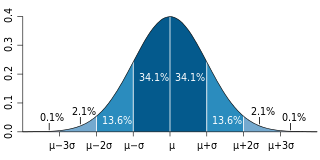
Physics is the scientific study of matter, its fundamental constituents, its motion and behavior through space and time, and the related entities of energy and force. Physics is one of the most fundamental scientific disciplines. A scientist who specializes in the field of physics is called a physicist.
In quantum mechanics, counterfactual definiteness (CFD) is the ability to speak "meaningfully" of the definiteness of the results of measurements that have not been performed. The term "counterfactual definiteness" is used in discussions of physics calculations, especially those related to the phenomenon called quantum entanglement and those related to the Bell inequalities. In such discussions "meaningfully" means the ability to treat these unmeasured results on an equal footing with measured results in statistical calculations. It is this aspect of counterfactual definiteness that is of direct relevance to physics and mathematical models of physical systems and not philosophical concerns regarding the meaning of unmeasured results.

Free will is the capacity or ability to choose between different possible courses of action.

Determinism is the philosophical view that all events in the universe, including human decisions and actions, are causally inevitable. Deterministic theories throughout the history of philosophy have developed from diverse and sometimes overlapping motives and considerations. Like eternalism, determinism focuses on particular events rather than the future as a concept. Determinism is often contrasted with free will, although some philosophers claim that the two are compatible. A more extreme antonym of determinism is indeterminism, or the view that events are not deterministically caused but rather occur due to random chance.
In philosophy, the philosophy of physics deals with conceptual and interpretational issues in physics, many of which overlap with research done by certain kinds of theoretical physicists. Historically, philosophers of physics have engaged with questions such as the nature of space, time, matter and the laws that govern their interactions, as well as the epistemological and ontological basis of the theories used by practicing physicists. The discipline draws upon insights from various areas of philosophy, including metaphysics, epistemology, and philosophy of science, while also engaging with the latest developments in theoretical and experimental physics.

Classical physics is a group of physics theories that predate modern, more complete, or more widely applicable theories. If a currently accepted theory is considered to be modern, and its introduction represented a major paradigm shift, then the previous theories, or new theories based on the older paradigm, will often be referred to as belonging to the area of "classical physics".
Causality is the relationship between causes and effects. While causality is also a topic studied from the perspectives of philosophy and physics, it is operationalized so that causes of an event must be in the past light cone of the event and ultimately reducible to fundamental interactions. Similarly, a cause cannot have an effect outside its future light cone.
Quantum indeterminacy is the apparent necessary incompleteness in the description of a physical system, that has become one of the characteristics of the standard description of quantum physics. Prior to quantum physics, it was thought that
In physics, a hidden-variable theory is a deterministic physical model which seeks to explain the probabilistic nature of quantum mechanics by introducing additional variables.
Predictability is the degree to which a correct prediction or forecast of a system's state can be made, either qualitatively or quantitatively.

Incompatibilism is the view that the thesis of determinism is logically incompatible with the classical thesis of free will. The term was coined in the 1960s, most likely by philosopher Keith Lehrer. The term compatibilism was coined to name the view that the classical free will thesis is logically compatible with determinism, i.e. it is possible for an ordinary human to exercise free will, even in a universe where determinism is true. These terms were originally coined for use within a research paradigm that was dominant among academics during the so-called "classical period" from the 1960s to 1980s, or what has been called the "classical analytic paradigm". Within the classical analytic paradigm, the problem of free will and determinism was understood as a compatibility question: "Is it possible for an ordinary human to exercise free will when determinism is true?" Those working in the classical analytic paradigm who answered "no" were incompatibilists in the original, classical-analytic sense of the term, now commonly called classical incompatibilists; they proposed that determinism precludes free will because it precludes the ability to do otherwise. Those who answered "yes" were compatibilists in the original sense of the term, now commonly called classical compatibilists. Given that classical free will theorists agreed that it is at least metaphysically possible for an ordinary human to exercise free will, all classical compatibilists accepted a compossibilist account of free will and all classical incompatibilists accepted a libertarian account of free will.

In the history of science, Laplace's demon was a notable published articulation of causal determinism on a scientific basis by Pierre-Simon Laplace in 1814. According to determinism, if someone knows the precise location and momentum of every atom in the universe, their past and future values for any given time are entailed; they can be calculated from the laws of classical mechanics.
Indeterminism is the idea that events are not caused, or are not caused deterministically.

Libertarianism is one of the main philosophical positions related to the problems of free will and determinism which are part of the larger domain of metaphysics. In particular, libertarianism is an incompatibilist position which argues that free will is logically incompatible with a deterministic universe. Libertarianism states that since agents have free will, determinism must be false.

The Emperor's New Mind: Concerning Computers, Minds and The Laws of Physics is a 1989 book by the mathematical physicist Roger Penrose.

Hard determinism is a view on free will which holds that determinism is true, that it is incompatible with free will, and therefore that free will does not exist. Although hard determinism generally refers to nomological determinism, it can also be a position taken with respect to other forms of determinism that necessitate the future in its entirety.
The deductive-nomological model of scientific explanation, also known as Hempel's model, the Hempel–Oppenheim model, the Popper–Hempel model, or the covering law model, is a formal view of scientifically answering questions asking, "Why...?". The DN model poses scientific explanation as a deductive structure, one where truth of its premises entails truth of its conclusion, hinged on accurate prediction or postdiction of the phenomenon to be explained.
Interactionism or interactionist dualism is the theory in the philosophy of mind which holds that matter and mind are two distinct and independent substances that exert causal effects on one another. An example of your mind influencing your body would be if you are depressed, you can observe the effects on your body, such as a slouched posture, a lackluster smile, etc. Another example, this time of your body affecting your mind would be: If you struck your toe very forcefully on a door, you would experience terrible pain. Interactionism is one type of dualism, traditionally a type of substance dualism though more recently also sometimes a form of property dualism. Many philosophers and scientists have responded to this theory with arguments both supporting and opposing its relevance to life and whether the theory corresponds to reality.
An index list of articles about the philosophy of science.

Decoding Reality: The Universe as Quantum Information is a popular science book by Vlatko Vedral published by Oxford University Press in 2010. Vedral examines information theory and proposes information as the most fundamental building block of reality. He argues what a useful framework this is for viewing all natural and physical phenomena. In building out this framework the books touches upon the origin of information, the idea of entropy, the roots of this thinking in thermodynamics, the replication of DNA, development of social networks, quantum behaviour at the micro and macro level, and the very role of indeterminism in the universe. The book finishes by considering the answer to the ultimate question: where did all of the information in the Universe come from? The ideas address concepts related to the nature of particles, time, determinism, and of reality itself.









